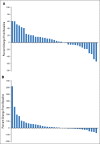Translational Breast Cancer Research Consortium (TBCRC) 022: A Phase II Trial of Neratinib for Patients With Human Epidermal Growth Factor Receptor 2-Positive Breast Cancer and Brain Metastases
- PMID: 26834058
- PMCID: PMC5070554
- DOI: 10.1200/JCO.2015.63.0343
Translational Breast Cancer Research Consortium (TBCRC) 022: A Phase II Trial of Neratinib for Patients With Human Epidermal Growth Factor Receptor 2-Positive Breast Cancer and Brain Metastases
Abstract
Purpose: Evidence-based treatments for metastatic, human epidermal growth factor receptor 2 (HER2)-positive breast cancer in the CNS are limited. Neratinib is an irreversible inhibitor of erbB1, HER2, and erbB4, with promising activity in HER2-positive breast cancer; however, its activity in the CNS is unknown. We evaluated the efficacy of treatment with neratinib in patients with HER2-positive breast cancer brain metastases in a multicenter, phase II open-label trial.
Patients and methods: Eligible patients were those with HER2-positive brain metastases (≥ 1 cm in longest dimension) who experienced progression in the CNS after one or more line of CNS-directed therapy, such as whole-brain radiotherapy, stereotactic radiosurgery, and/or surgical resection. Patients received neratinib 240 mg orally once per day, and tumors were assessed every two cycles. The primary endpoint was composite CNS objective response rate (ORR), requiring all of the following: ≥ 50% reduction in volumetric sum of target CNS lesions and no progression of non-target lesions, new lesions, escalating corticosteroids, progressive neurologic signs/symptoms, or non-CNS progression--the threshold for success was five of 40 responders.
Results: Forty patients were enrolled between February 2012 and June 2013; 78% of patients had previous whole-brain radiotherapy. Three women achieved a partial response (CNS objective response rate, 8%; 95% CI, 2% to 22%). The median number of cycles received was two (range, one to seven cycles), with a median progression-free survival of 1.9 months. Five women received six or more cycles. The most common grade ≥ 3 event was diarrhea (occurring in 21% of patients taking prespecified loperamide prophylaxis and 28% of those without prophylaxis). Patients in the study experienced a decreased quality of life over time.
Conclusion: Although neratinib had low activity and did not meet our threshold for success, 12.5% of patients received six or more cycles. Studies combining neratinib with chemotherapy in patients with CNS disease are ongoing.
Trial registration: ClinicalTrials.gov NCT01494662.
© 2016 by American Society of Clinical Oncology.
Conflict of interest statement
Authors' disclosures of potential conflicts of interest are found in the article online at www.jco.org. Author contributions are found at the end of this article.
Figures
References
-
- Lin NU, Winer EP. Brain metastases: The HER2 paradigm. Clin Cancer Res. 2007;13:1648–1655. - PubMed
-
- Bendell JC, Domchek SM, Burstein HJ, et al. Central nervous system metastases in women who receive trastuzumab-based therapy for metastatic breast carcinoma. Cancer. 2003;97:2972–2977. - PubMed
-
- Pestalozzi BC. Brain metastases and subtypes of breast cancer. Ann Oncol. 2009;20:803–805. - PubMed
-
- Kennecke H, Yerushalmi R, Woods R, et al. Metastatic behavior of breast cancer subtypes. J Clin Oncol. 2010;28:3271–3277. - PubMed
-
- Lin NU, Bellon JR, Winer EP. CNS metastases in breast cancer. J Clin Oncol. 2004;22:3608–3617. - PubMed
Publication types
MeSH terms
Substances
Associated data
Grants and funding
LinkOut - more resources
Full Text Sources
Other Literature Sources
Medical
Research Materials
Miscellaneous



